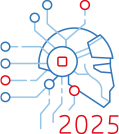Predictions for 2025

AI in 2025
We have now entered 2025, and there is no doubt that artificial intelligence (AI) will be a transformative force in the IT industry this year, but also a topic of heated debate.
Over the past few years, artificial intelligence has driven IT innovation and is in the process of redefining the way we work and do business. However, the new technology has also sparked discussions and raised concerns about cybersecurity and regulation, among other things.
From productivity-enhancing tools to exploitation in cyberattacks, the dual-sided nature of AI is undeniable, and where some see opportunities in artificial intelligence, others see a threat.
What lies ahead for AI in the coming year?
AI technology is developing at lightning speed, and in 2025 it will undoubtedly continue to change how companies operate and optimize their business. Companies like Microsoft are investing heavily in AI and new data centers are being built to meet the growing demand for computing power.
As we saw at Directions EMEA 2024, AI is also increasingly being integrated into Business Central, and the introduction of the Sales Order Agent to automate sales order creation, which will be released in June, is just the first step in the launch of a series of agents.

The new programming language
The ‘new language’ of 2025 is not Python or a completely new programming language – it is the natural language that we all know and use every day. A growing number of platforms and applications are making it easy for users without programming language knowledge and coding expertise to easily create intelligent systems through code-free AI tools. Entrepreneurs, consultants, and users can now build sophisticated services without writing a single line of code.
Instead of dedicating months and years to mastering a programming language, individuals can focus on implementing their ideas in natural language, i.e. by writing a prompt. These natural language interfaces will increasingly change how companies develop and adapt their systems, removing the need for a technical translation layer and streamlining and streamlining the development process.
|
What is a prompt?
A ‘prompt’ is a short command or question that describes what you want the AI service to do or answer. |
A good example of this trend is Copilot Studio, where users can build intelligent, dynamic, and connected AI assistants that can automate processes in Business Central.

Microsoft is investing heavily in AI
By 2025, Microsoft plans to invest about $80 billion – equivalent to 579 billion kroner – in data centers for artificial intelligence (AI).
The investment will be made in the current fiscal year, which runs until the end of June. More than half of the amount, 579 billion kroner, will be spent on data centers within the United States.
The purpose of the data centers is to strengthen Microsoft’s capacity to train AI models and launch new AI features for Microsoft’s many applications and services, including Business Central. According to Microsoft itself, the next four years could well create nothing less than the foundation for the United States’ economic success for the next 25 years.
|
Microsoft at the forefront
Microsoft has already positioned itself as a key player in AI development, not least thanks to its collaboration with OpenAI, the company behind the popular chatbot ChatGPT. |

AI agents
In a few years, we could potentially find ourselves in a world populated by a sea of AI agents, each specialized in specific tasks. From streamlining marketing analysis and drafting legal documents to delivering personalized learning, these agents will autonomously and efficiently handle a wide range of specific functions in our society and workplaces.
AI agents in Business Central
In June, Microsoft will introduce the Sales Order Agent in Business Central 26, which will allow you to automate the creation of sales orders, but more agents are on the way, and there is no doubt that they will become an integral part of the business platform in the future.
With the introduction of autonomous agents in Business Central and the rest of the Dynamics 365 business platform, Microsoft is already revolutionizing the way companies do business. The AI-based agents enable a transition from traditional manual operations to modern, AI-driven automation.

Business Central 26
A major event in 2025 will of course also be the launch of Business Central 26, which Microsoft will release in April as part of the Dynamics 365 2025 Release Wave 1 upgrade wave.
AI will also receive a very special focus in Business Central 26. The AI-based features include, for example, the introduction of the sales order agent to automate the creation of sales orders, the ability to ask Copilot about errors and the inclusion of ISV documentation as a knowledge base.
|
Two annual updates
Microsoft releases a new version of Business Central twice a year. The upgrades will be released in April and October, as part of the Dynamics 365 release wave upgrade waves, which launch upgrades to all the business apps that make up the Dynamics 365 business platform. |
In addition to the new and improved AI features, which continue to be a main focus for Microsoft, this update brings a number of other improvements that elevate the user experience and increase efficiency, including:
- Finance
In the finance area, tools are introduced that make it easier to automate and streamline your company's financial processes. - Reporting
At the same time, new reporting functions are added that provide more advanced options for data visualization and analysis. - SCM
Within supply chain management, users can look forward to improvements that optimize inventory management, logistics and collaboration with suppliers. - Administration
The administration area is also upgraded with tools that make daily task solving and resource management more agile and efficient.
These updates are designed to strengthen business processes across organizations and give companies better tools to grow and adapt to changing market conditions.
